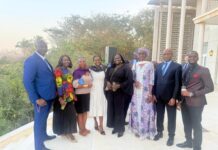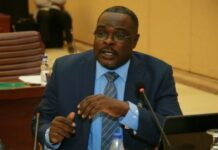35 Years On, Strengthen Its Independence, Civil Society Role
The growing importance of intensified protection of human rights on the African continent comes into sharp focus at a time when several countries across the continent are facing acute human rights crises, Human Rights Watch said today, noting that the African Commission on Human and Peoples’ Rights marks its 35th anniversary during its 73rd ordinary session in November 2022.
The African Commission, based in Banjul, Gambia, is a quasi-judicial mechanism tasked with promoting and protecting human rights and collective rights as well as interpreting the African Charter on Human and Peoples’ Rights. The Commission receives complaints from states parties, individuals, and nongovernmental organizations (NGOs) from all 55 African Union member states.
“The Commission’s establishment 35 years ago is an important reminder that political independence and the liberation of Africa are best achieved when underpinned by human rights and democratic governance,” said Carine Kaneza Nantulya, deputy Africa director at Human Rights Watch. “African leaders should ensure its independence and respect its rulings.”
The Commission was founded to defend both individual and collective human rights following a period when the Organization of African Unity (OAU), the AU’s predecessor, did not place emphasis on individual rights and freedoms. In the 1970s, with no regional human rights mechanism, civil society groups and international organizations worked to expose human rights abuses on the continent. In 1979, a group of experts produced a draft charter on human and peoples’ rights, which was unanimously adopted at a 1981 OAU heads of state meeting in Nairobi, Kenya, thus creating the Commission on November 2, 1987.
Beginning in 2020, Human Rights Watch spoke to 46 African activists, thought leaders, experts, and former and current members of the Commission and the African Court on Human and Peoples’ Rights who reflected on the Commission’s impact and its challenges.
Apart from the Commission, the AU created the African Court on Human and Peoples’ Rights by a protocol to the African Charter adopted on June 9, 1998, which entered into force on January 25, 2004. The court has jurisdiction over cases and disputes concerning human rights violations and complements the Commission’s mandate.
The Commission has issued critical decisions, including the 2016 ruling on the Democratic Republic of Congo (DRC), that have expanded standards and understanding on human rights in Africa and the rest of the world, including on the right to development, Indigenous peoples’ rights, women’s rights, children’s rights, media freedoms, and rights-focused government responses to the Covid-19 pandemic.
The Commission, in its 2016 landmark ruling, stated that the Congolese government violated numerous human rights in its brutal repression of peaceful protests against the harmful operations of a foreign mining company. This ruling had a significant impact on the jurisprudence of development as it included a breach of the rights to housing, while highlighting the need and legal imperative for entities engaged in extractive industries to undertake their operations with due regard to the rights of the host communities.
Another landmark ruling of the Commission was its 2010 ruling in the Endorois case where it found multiple violations of the African Charter in the eviction of the Endorois people from their homeland in central Kenya. It was the first ruling of any international tribunal to find a violation of the right to development, and the first ruling to explain who Indigenous peoples in Africa are, and what are their rights to land.
The Commission has also adopted resolutions on various human rights issues across the continent. In 2020, it issued a resolution reaffirming that human rights and freedoms should be central in governments’ responses to the Covid-19 pandemic.
In 2021, the Commission adopted a resolution to respect, without restriction, the principle of nonrefoulement of asylum seekers and refugees. The resolution condemned all expulsions of asylum seekers and refugees to countries where their lives or freedoms would be threatened.
In a March 2022 resolution, the Commission urged AU member states to take steps to protect marginalized groups and ensure their right to food and nutrition, including during protracted crisis, conflicts, and natural disasters.
Notably, the Commission has also developed legal guidance on how to implement many key human rights set out in the African Charter and other human rights treaties and documents such as the Protocol to the African Charter on Human and Peoples’ Rights on the Rights of Women in Africa (the “Maputo Protocol”). This legal guidance includes general comments and guidelines aimed at building upon existing legal obligations of African States. The guidelines are a key tool for formulating standards, principles, and rules on which African governments can base their legislation. In May 2022, the Commission adopted its Guidelines on the Protection of All Persons from Enforced Disappearances in Africa.
The Commission, in collaboration with African activists, has been a driving force in African norms setting and standards development, including through the creation of important mechanisms such as a Special Rapporteur on Prisons, Conditions of Detention and Policing in Africa in 1996, a Special Rapporteur for Women’s Rights in 1999, a Special Rapporteur on Human Rights Defenders and Focal Point on Reprisals in Africa, and a Special Rapporteur on Freedom of Expression and Access to Information in 2004, among others. The dynamic relationship between the Commission and regional civil society groups has led to an increase in the number of groups with observer status at the Commission from a few dozen in the 1980s to more than 500 today.
While these examples provide ample evidence that the Commission has in many ways delivered on its protection and promotion mandate, it continues to face challenges that impede its effectiveness, especially because AU member states refuse to carry out decisions of the Commission and other AU organs on the deepening human rights violations and democratic crises affecting the continent.
The situation is compounded by the decision in June 2018 of the AU Executive Council to restrict the mandate and independence of the Commission, threatening to leave it obsolete and irrelevant and undermine the Commission’s progress in the last three decades.
“Despite serious challenges, the Commission has stood its ground and sided with countless victims of rights violations by using resolutions and rulings against abusive governments and introducing complaints before the African Court,” Kaneza Nantulya said. “The Commission is probably the most important institution that Africans created to realize the objectives and foundational values of the AU.”






